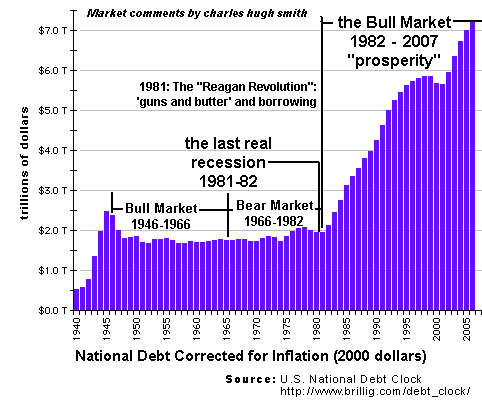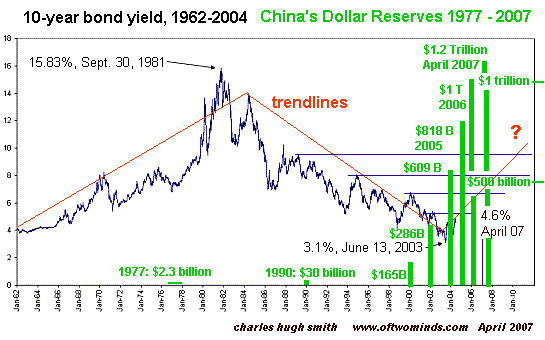

|
| weblog/wEssays archives | home | |
|
Why Interest Rates Will Have to Rise (May 30, 2007) This may be one of the most important entries of the year. I admit, it's not truly earth-shattering like the news of which airhead starlet has been arrested this week for a DUI on the Pacific Coast Highway, but since it's about money on a global scale, it might be of some interest (pun intended). Let's go through the standard reasoning about interest rates. One school of thought believes that the bursting of the global debt bubble will lead to deflation, and this will cause the Federal Reserve to lower interest rates in order to keep the bubble (borrow and spend) economy pumped up. The other school of thought foresees inflation or even hyper-inflation as the inevitable result of a hyper-inflationary monentary policy (easy lending, low rates, endless funds available for lending). To save what's left of the dollar, the Fed will eventually have to raise interest rates. What if both scenarios are missing the point? What if interest rates will have to rise regardless of inflation or deflation or the slowing economy? Let's start with a chart, courtesy of www.brillig.com (the debt clock). This is an inflation-adjusted depiction of the U.S. National Debt--the debt which has accumulated from years of massive deficit spending and borrowing from foreign entities. (The comments in black are mine.) 
Do you notice the tiny little difference between the previous Bull Market era of prosperity (1946-1966) and the current era of "prosperity"? Hmm, this is a tough one. . . could it be those decades of massive, explosive deficits? What kind of "prosperity" requires borrowing trillions of dollars to sustain it? Can it even be called "prosperity" if a significant driver was borrowed money? Even during the "non-prosperous" Bear Market era of stagflation in the 70s, the nation didn't borrow much more than it had during boom times (adjusted for inflation, which rose in the late 70s and early 80s). For a comparison of that era and our own, let's turn to correspondent Mark P.'s recent observations: (emphasis added) I was reading this article on rising gasoline prices and started to think about the past, particularly the late 70s when I was a kid.Mark's commentary led me to this conclusion: the debt is already so large, the Treasury will soon have no choice but to raise long-term interest rates. To see why, let's look at another chart: 
Notice how the Chinese central bank has ramped up its purchase of U.S. Treasuries to what is clearly an unsustainable rate. Before we go on, let's recall a few key points: The cliche repeated in the mainstream media is that China continues buying hundreds of billions of U.S. bonds every year as a "safe" investment." How "safe" is an investment which has lost 1/3 of its value in the past 5 years? (The dollar Index has fallen from 120 in 2002 to 82.) We all know the real reason China has been pouring the vast majority of its foreign reserves into Treasuries--to support low interest rates and therefore the purchasing power of the dauntless "borrow and spend" American consumer. The larger question is: how sustainable is a debt machine dependent on the fortunes and good will of one's trading partners? What could cause the Chinese to cease new purchases or to even start selling Treasuries from their horde of $1.3 trillion? (It's rising by about $125 billion a quarter.) Once the Chinese either decide to stop supporting the U.S. debt machine, or find they no longer can do so regardless of their desire, the market for low-interest rate Treasuries dries up. Yes, the Gulf states are big buyers, too, but there is no evidence they can double or triple their bond purchases to cover what China currently buys. How vulnerable are we? Very. One solution is to stop running deficits of $300 - $400 billion a year; that would be $400 billion less debt we need to find buyers for. But which of our elected officials would have to courage to cut $400 billion in spending? The real problem is the debt is already unsustainably large. Even if we as a nation stopped spending more than the government collects, the existing debt constantly rolls over and has to be refinanced. If money dries up globally, we are in a real pickle. With a negative savings rate, does anyone seriously believe we can fund our own deficit? And here's one more "follow the money" line of thought. Who gets hurt if the Treasury refuses to support the plummeting bond/dollar by raising interest rates? Joe Sixpack? Not really. How much does Joe Sixpack buy that is made in Europe or Japan? The Japanese nameplate vehicle he buys is actually made in the U.S.; only the profit is repatriated to the home country. If he travels outside the U.S., then the weak dollar will hurt his purchasing power--but how often does Joe Sixpack go to Europe or Japan? (Recall that the Chinese yuan is pegged to the dollar and does not fluctuate much even as the dollar tanks.) As for food--it's mostly priced in dollars. Ditto oil/energy, so a plummeting dollar will have little effect on Joe's purchase of these commodities (unless OPEC starts pricing oil in euros. Then it's Katie Bar the Door.) No, the big losers in a bond/dollar collapse are the wealthy. As documented here many times (via links to the Wall Street Journal), the top 5% of U.S. citizens own about 2/3 of all the stocks, bonds and real estate in the country. If the bond and/or dollar drops through the floor, their holdings will be worth a lot less globally--and the wealthy of the world are global players. So ask yourself: if our patsy trading partners are no longer willing or able to gamble all their surpluses on the dollar and Treasuries, or we have finally worn out our welcome in China and the Gulf so that politicians/bankers in those regions decide to stop supporting low interest rates in the U.S., then will our politicians really care about Joe Sixpack losing his bubble-priced home? The short answer is no. They will care about the wealthy, who fund their campaigns. Joe Sixpack doesn't even bother to vote (U.S. voter turnout is barely 40%; in the recent French election, turnout was 85%.) Yes, there will be tearful speeches and a lot of hot air expended about poor Joe, but when push comes to shove, the Treasuries have to be sold--there is no Plan B--and the wealthy's holdings in dollars will have to be defended. Joe Sixpack? Sorry pal, suck it up; you blew it signing that adjustable rate mortgage and paying bubblicious prices and tapping all your equity with a home equity line of credit. Too bad you believed all that mainstream media shuck and jive about interest rates staying low forever. For more on this subject and a wide array of other topics, please visit my weblog. copyright © 2007 Charles Hugh Smith. All rights reserved in all media. I would be honored if you linked this wEssay to your site, or printed a copy for your own use. |
||
| weblog/wEssays | home |